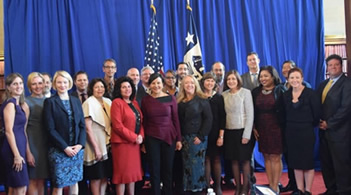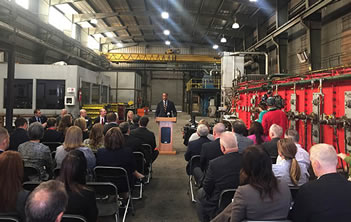November 29, 2016
Guest post by Sandra Watson, President and CEO of the Arizona Commerce Authority.
Commerce Blog
 Arizona has emerged as one of the fastest-growing technology hubs in the United States.
Arizona has emerged as one of the fastest-growing technology hubs in the United States.
Our technology and innovation ecosystem has evolved into a place where digital-age entrepreneurs are starting new companies, attracting new venture capital, and testing new models in a rapidly changing marketplace.
At the heart of this growth is Information Technology. IT is ubiquitous – touching nearly every business sector that exists today.
The market demand for a qualified IT workforce is rising, and there is a critical need for current and future tech talent that extends to a wide range of industries. It’s not unique to Arizona. By 2022, IT job openings nationwide are expected to exceed more than 1.3 million.
For this reason, the Arizona Commerce Authority (ACA) was honored to lead the Greater Phoenix regional team – one of only seven regions nationally – along with our partners, the Arizona Technology Council and Cox Communications, in this groundbreaking workforce program aimed at closing the IT talent gap.
> Read more
November 28, 2016
Commerce Blog
 As the economy becomes increasingly dependent on complex technology, automation and reorganization, the nation will face new workforce and economic development challenges. One prominent challenge is the need to provide the skills for tomorrow’s workforce. From 2002 to 2014, the share of high-skilled jobs in the economy increased by seven percent; and according to the 2016 OECD report, ‘New Forms of Work in the Digital Economy’, this trend will become more pronounced in the future. Access to skilled labor is a key factor when companies — domestic or international — choose to invest in the United States.
As the economy becomes increasingly dependent on complex technology, automation and reorganization, the nation will face new workforce and economic development challenges. One prominent challenge is the need to provide the skills for tomorrow’s workforce. From 2002 to 2014, the share of high-skilled jobs in the economy increased by seven percent; and according to the 2016 OECD report, ‘New Forms of Work in the Digital Economy’, this trend will become more pronounced in the future. Access to skilled labor is a key factor when companies — domestic or international — choose to invest in the United States.
Across the country, business leaders have shared the concern that America’s workforce is not adequately prepared for many of the jobs they desperately need to fill. The availability of a skilled workforce is often cited as a primary factor considered by businesses in their investment decision process.
> Read more
November 22, 2016
Blog post by Nathan Ohle, Senior Advisor at the Economic Development Administration
 Across the country, locally-driven economic development strategies and partnerships are helping to create economic mobility and opportunity for some of the most distressed communities. The challenges that large and small communities face in today’s complex economy require the federal government to explore new approaches and new ways to partner with and empower locally-led innovators. With its place-based approach to economic development, the Obama administration has empowered local leaders in distressed communities by breaking down federal government silos and encouraging collaboration among agencies and local leaders.
Across the country, locally-driven economic development strategies and partnerships are helping to create economic mobility and opportunity for some of the most distressed communities. The challenges that large and small communities face in today’s complex economy require the federal government to explore new approaches and new ways to partner with and empower locally-led innovators. With its place-based approach to economic development, the Obama administration has empowered local leaders in distressed communities by breaking down federal government silos and encouraging collaboration among agencies and local leaders.
Last week, President Obama signed the Community Solutions Council Executive Order that recognizes this approach to place-based work, creating the Community Solutions Council.
> Read more
November 21, 2016
Commerce Blog
 An employer-aligned, demand-driven comprehensive approach to skills development is essential to helping businesses across all sectors better access skilled workers in order to grow, innovate, and increase productivity.
An employer-aligned, demand-driven comprehensive approach to skills development is essential to helping businesses across all sectors better access skilled workers in order to grow, innovate, and increase productivity.
In recognition of this need, the Economic Development Administration (EDA) and other federal agencies, including the U.S Departments of Labor and Education, are partnering to focus on the development of workforce training programs.
Under the Commerce Department’s Skills for Business initiative, EDA has incorporated job-driven training principles into its Comprehensive Economic Development Strategy (CEDS) (PDF) guidelines to help communities focus on addressing their local and regional workforce needs.
> Read more
November 15, 2016
 Earlier today, U.S. Secretary of Commerce Penny Pritzker announced 35 organizations from 19 states that will receive nearly $15 million to create and expand cluster-focused proof-of-concept and commercialization programs and early-stage seed capital funds. The diverse group of nonprofits, institutions of higher education, and other entrepreneurship-focused organizations will secure funding through the Regional Innovation Strategies (RIS) program, an initiative housed in the Department of Commerce’s Economic Development Administration (EDA).
Earlier today, U.S. Secretary of Commerce Penny Pritzker announced 35 organizations from 19 states that will receive nearly $15 million to create and expand cluster-focused proof-of-concept and commercialization programs and early-stage seed capital funds. The diverse group of nonprofits, institutions of higher education, and other entrepreneurship-focused organizations will secure funding through the Regional Innovation Strategies (RIS) program, an initiative housed in the Department of Commerce’s Economic Development Administration (EDA).
Since 2014, EDA has invested nearly $40 million in RIS grantees that have leveraged more than $46 million in additional private matching funds. The program provides the technical and business assistance and access to capital that helps organizations transform ideas into products and services and, ultimately, into jobs.
> Read more
November 2016 Newsletter
 The Obama administration strongly believes that our country is at its best when we harness the talents of all parts of our society, and our greatest accomplishments are achieved when diverse perspectives are brought to help overcome our greatest challenges.
The Obama administration strongly believes that our country is at its best when we harness the talents of all parts of our society, and our greatest accomplishments are achieved when diverse perspectives are brought to help overcome our greatest challenges.
On October 6, 2016 the Department of Commerce welcomed 30 diverse leaders in innovation, entrepreneurship and employer-driven talent development from across the country to the National Advisory Council on Innovation & Entrepreneurship (NACIE).
> Read more
November 2016 Newsletter
 The University Center Economic Development Program at EDA helps make the resources of local universities available to the economic development communities in their areas. One such program is located in North Dakota.
The University Center Economic Development Program at EDA helps make the resources of local universities available to the economic development communities in their areas. One such program is located in North Dakota.
Funding from the University Center Program has facilitated the development of many groundbreaking innovations through North Dakota State University’s Research and Technology Park’s Innovation Challenge.
> Read more
November 2016 Newsletter
 An employer-aligned, demand-driven comprehensive approach to skills development is essential to helping businesses across all sectors better access skilled workers in order to grow, innovate, and increase their productivity.
An employer-aligned, demand-driven comprehensive approach to skills development is essential to helping businesses across all sectors better access skilled workers in order to grow, innovate, and increase their productivity.
In recognition of this need, EDA and other federal agencies, including the U.S Departments of Labor and Education, are partnering to focus on the development of workforce training programs.
> Read more
November 14, 2016
(Commerce Blog)
 It is imperative that U.S. businesses have access to skilled workers in order to grow and thrive. At the Department of Commerce, Secretary Pritzker has made skills and workforce development a top priority, and is working with the private sector and government leaders at all levels as part of the Department’s Skills for Business initiative to prepare workers with the training needed to secure the 21st century jobs business leaders are seeking to fill.
It is imperative that U.S. businesses have access to skilled workers in order to grow and thrive. At the Department of Commerce, Secretary Pritzker has made skills and workforce development a top priority, and is working with the private sector and government leaders at all levels as part of the Department’s Skills for Business initiative to prepare workers with the training needed to secure the 21st century jobs business leaders are seeking to fill.
In Appalachia and other historically coal-producing regions across the nation, changes in the U.S. power sector, largely driven by market forces, have negatively impacted many local and regional economies that have primarily depended on coal as a source of good jobs and investment.
> Read more
 Arizona has emerged as one of the fastest-growing technology hubs in the United States.
Arizona has emerged as one of the fastest-growing technology hubs in the United States.


 As the economy becomes increasingly dependent on complex technology, automation and reorganization, the nation will face new workforce and economic development challenges. One prominent challenge is the need to provide the skills for tomorrow’s workforce. From 2002 to 2014, the share of high-skilled jobs in the economy increased by seven percent; and according to the 2016 OECD report,
As the economy becomes increasingly dependent on complex technology, automation and reorganization, the nation will face new workforce and economic development challenges. One prominent challenge is the need to provide the skills for tomorrow’s workforce. From 2002 to 2014, the share of high-skilled jobs in the economy increased by seven percent; and according to the 2016 OECD report,  Across the country, locally-driven economic development strategies and partnerships are helping to create economic mobility and opportunity for some of the most distressed communities. The challenges that large and small communities face in today’s complex economy require the federal government to explore new approaches and new ways to partner with and empower locally-led innovators. With its place-based approach to economic development, the Obama administration has empowered local leaders in distressed communities by breaking down federal government silos and encouraging collaboration among agencies and local leaders.
Across the country, locally-driven economic development strategies and partnerships are helping to create economic mobility and opportunity for some of the most distressed communities. The challenges that large and small communities face in today’s complex economy require the federal government to explore new approaches and new ways to partner with and empower locally-led innovators. With its place-based approach to economic development, the Obama administration has empowered local leaders in distressed communities by breaking down federal government silos and encouraging collaboration among agencies and local leaders. An employer-aligned, demand-driven comprehensive approach to skills development is essential to helping businesses across all sectors better access skilled workers in order to grow, innovate, and increase productivity.
An employer-aligned, demand-driven comprehensive approach to skills development is essential to helping businesses across all sectors better access skilled workers in order to grow, innovate, and increase productivity. Earlier today, U.S. Secretary of Commerce Penny Pritzker
Earlier today, U.S. Secretary of Commerce Penny Pritzker  The Obama administration strongly believes that our country is at its best when we harness the talents of all parts of our society, and our greatest accomplishments are achieved when diverse perspectives are brought to help overcome our greatest challenges.
The Obama administration strongly believes that our country is at its best when we harness the talents of all parts of our society, and our greatest accomplishments are achieved when diverse perspectives are brought to help overcome our greatest challenges. The
The  An employer-aligned, demand-driven comprehensive approach to skills development is essential to helping businesses across all sectors better access skilled workers in order to grow, innovate, and increase their productivity.
An employer-aligned, demand-driven comprehensive approach to skills development is essential to helping businesses across all sectors better access skilled workers in order to grow, innovate, and increase their productivity. It is imperative that U.S. businesses have access to skilled workers in order to grow and thrive. At the Department of Commerce, Secretary Pritzker has made skills and workforce development a top priority, and is working with the private sector and government leaders at all levels as part of the Department’s Skills for Business initiative to prepare workers with the training needed to secure the 21st century jobs business leaders are seeking to fill.
It is imperative that U.S. businesses have access to skilled workers in order to grow and thrive. At the Department of Commerce, Secretary Pritzker has made skills and workforce development a top priority, and is working with the private sector and government leaders at all levels as part of the Department’s Skills for Business initiative to prepare workers with the training needed to secure the 21st century jobs business leaders are seeking to fill.